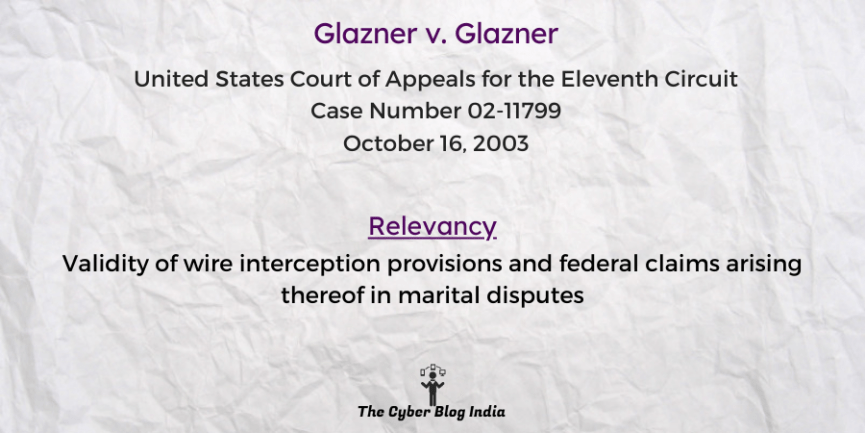Glazner v. Glazner

Glazner v. Glazner
347 F.3d 1212
In the United States Court of Appeals for the Eleventh Circuit
Case Number 02-11799
Before Chief Judge Edmondson, Circuit Judge Tjoflat, Circuit Judge Anderson, Circuit Judge Birch, Circuit Judge Dubina, Circuit Judge Black, Circuit Judge Black, Circuit Judge Carnes, Circuit Judge Barkett, Circuit Judge Hull, Circuit Judge Marcus, and Circuit Judge Wilson
Decided on October 16, 2003
Relevancy of the Case: Validity of wire interception provisions and federal claims arising thereof in marital disputes
Statutes and Provisions Involved
- The Omnibus Crime Control and Safe Streets Act, 18 U.S.C. §§ 2510-2520
Relevant Facts of the Case
- The plaintiff wife and the defendant husband were married for 19 years. During the divorce proceedings, the husband put a recording device in their marital home. This device recorded several conversations between the wife and third parties without the consent of any party to the conversation.
- When the wife discovered this device, she filed a complaint before the District Court and sought damages. However, the District Court granted the husband’s motion for summary judgment by following the precedent of Simpson v. Simpson.
Opinion of the Bench
- Section 2520(a) applies to any person. It does not distinguish between married and unmarried persons or between spouses or partners.
- Every state in this circuit has made wiretapping of the type done by the husband a crime. Under the Alabama Code, recording private communications is a misdemeanour.
- No interspousal wiretapping exception exists in Title III.
- The court also examined if it can set a new precedent today, considering it was sitting en banc.
Final Decision
- The court, by majority, set aside the District Court’s judgment and remanded the case for further proceedings. Chief Judge Edmondson, along with Circuit Judges Birch, Wilson, and Black, dissented from the majority opinion as they were not in favour of the retroactive applicability of this precedent.
